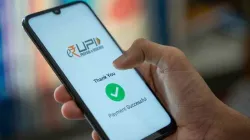Make UPI payments without using bank account: Everything you need to know
The National Payment Corporation of India (NPCI) is set to enhance its UPI service with features like face unlock and the new Delegated Payment System. This initiative aims to make UPI more inclusive by allowing users without their bank accounts to access the service.

The National Payment Corporation of India (NPCI) is preparing to upgrade its UPI (Unified Payments Interface) service, bringing new features like face unlock and a significant initiative called the Delegated Payment System. This new system aims to make UPI more inclusive, offering the service to those without their bank accounts. The government is also focused on making UPI accessible to everyone, including those who currently cannot use it due to a lack of a bank account.
UPI service now requires a bank account
At present, to use UPI services, a user needs to have a linked bank account. UPI accounts are activated using the mobile number and Aadhaar card linked to the user's bank account. Users can create a UPI account via various apps, enabling digital payments. However, NPCI is working to expand this service so that individuals without their bank accounts can also access UPI for payments.
What is the Delegated Payment System?
The Delegated Payment System enable the family members to use the same UPI account even if they do not have their bank account.
For instance, if one family member has a bank account with UPI service activated, other members can link their phones to the same UPI account. This system only applies to savings accounts and will not support credit cards or other credit lines. The primary account holder will have master access and can delegate payment permissions to others.
How will it work?
- Once launched, NPCI will notify UPI users to set up their savings accounts for use by others.
- Users can opt to activate this feature, after which a verification process may follow.
- Once the delegated system is activated, multiple users will be able to make payments using the same UPI account.
While NPCI has not yet provided specific details or limits on transactions, it is expected that this system will significantly boost UPI usage, potentially increasing UPI payments by 25 to 30 per cent.
What to expect in the future?
Though NPCI has not yet officially launched the Delegated Payment System, it is expected to revolutionize how UPI is used, particularly for families and groups with shared bank accounts. By extending UPI services to those without direct access to a bank account, this initiative could greatly enhance financial inclusion across the country.
ALSO READ: Airtel expands mobile network to remote village of Phobrang near Indo-China border
ALSO READ: Microsoft to discontinue Paint 3D App from Windows: Here's why
